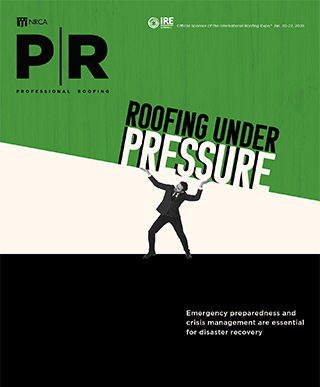GAF, NRCA and WSRCA launch safety website
GAF has partnered with NRCA and the Western States Roofing Contractors Association (WSRCA) to launch a new safety website, www.gaf.com/safety.
The site features:
- A monthly webinar series hosted by NRCA, highlighting the most commonly cited safety issues with specific guidance about what is required to remain in compliance
- A free archive of NRCA University safety webinars
- A library of WSRCA toolbox talks available for download to help contractors supplement their Occupational Safety and Health Administration (OSHA) training efforts
- A GAF Low-Slope Safety Kit available for purchase, containing many common roof safety items needed on a commercial job, including an OSHA-approved first-aid kit, fire extinguisher, perimeter flags, gloves, a hard hat and NRCA's Pocket Guide to Safety
"While safety is a concern for roofing contractors, it's also one for GAF, NRCA and WSRCA," says Brian Impellizeri, GAF's senior marketing manager. "This partnership allows us to collectively leverage our assets and capabilities to deliver a resource that increases awareness and understanding of low-slope safety."
RCMA and RRCI merge
The Roof Coatings Manufacturers Association (RCMA) and Reflective Roof Coatings Institute (RRCI) have merged to better position the roof coatings industry in various legislative, regulatory and building code development arenas that affect the two associations' consolidated membership.
"RCMA is thrilled to merge with the Reflective Roof Coatings Institute," says John Ferraro, RCMA's executive director. "RRCI has been a leader on reflective roof coatings issues and we look forward to their members' expertise within RCMA. This merger will go a long way to increase RCMA's growth in both its membership and its recognition within the larger roofing industry."
The association will continue to be called the Roof Coatings Manufacturers Association and will keep its existing logo and website, www.roofcoatings.org. It will remain in RCMA's Washington, D.C., office and will be managed by existing RCMA staff.
IRS increases standard mileage rates
The Internal Revenue Service (IRS) has increased the 2015 optional standard mileage rates used to calculate the costs of operating an automobile for business, charitable, medical or moving purposes. As of Jan. 1, the rates for use of a car, van, pickup or panel truck follow:
- 57.5 cents per mile for business miles driven, an increase from 56 cents in 2014
- 23 cents per mile driven for medical or moving purposes, down half a cent from 2014
- 14 cents per mile driven in service of charitable organizations
For more information, visit www.irs.gov.
OSHA levies fine for employee retaliation
The Occupational Safety and Health Administration (OSHA) has ordered Metro-North Commuter Railroad Co., Amenia, N.Y., to pay an employee, a coach cleaner for the rail carrier, $250,000 in punitive damages, $10,000 in compensatory damages and the cost of attorney's fees after an investigation revealed the employee was retaliated against for reporting a knee injury he suffered Nov. 17, 2011.
According to OSHA, while driving the injured employee to a hospital, a Metro-North Commuter Railroad supervisor reportedly told the worker employees who are injured on the job are written up for safety violations and not considered for advancement or promotions. Soon after the employee reported the work-related injury, Metro-North Commuter Railroad issued disciplinary charges against him. The employee filed an initial Federal Railroad Safety Act (FRSA) anti-discrimination complaint with OSHA April 19, 2012. An amended complaint was filed April 9, 2013, after the railroad company issued additional disciplinary charges.
"When employees, fearing retaliation, hesitate to report work-related injuries and the safety hazards that caused them, companies cannot fix safety problems and neither employees nor the public are safe," says Dr. David Michaels, OSHA's assistant secretary of labor. "In this case, Metro-North's conduct was deliberate and discriminatory, and we have assessed the maximum amount in punitive damages allowed under the law."
According to OSHA, the Metro-North Commuter Railroad case represents the largest punitive damages ever awarded in a retaliation case under the FRSA. OSHA enforces whistleblower provisions of the FRSA, which protect employees who report violations. Under these laws, employers are prohibited from retaliating against employees who raise protected concerns or provide protected information to the government. More information about OSHA's Whistleblower Protection Program is available at www.whistleblowers.gov.



